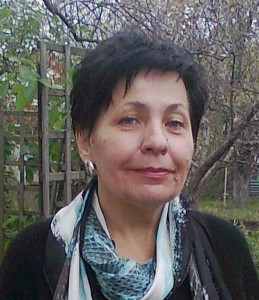 Galina Yavorska, a professor and sociolinguist at the National Institute of Strategic Studies, Kyiv, Ukraine. Dr. Yavorska’s research interests are in sociolinguistics, lexical semantics, discourse analysis, global and security studies. She researches relationships between language and politics focusing on language ideologies and language loyalty.
Galina Yavorska, a professor and sociolinguist at the National Institute of Strategic Studies, Kyiv, Ukraine. Dr. Yavorska’s research interests are in sociolinguistics, lexical semantics, discourse analysis, global and security studies. She researches relationships between language and politics focusing on language ideologies and language loyalty.
Educational Background
2000 – Doctor of Sciences / Habilitation in Linguistics (General Linguistics), The Institute of the Ukrainian language National Academy of Sciences (NAS) of Ukrainehttp://translate.google.com.ua/translate?hl=uk&sl=en&u=http://www1.nas.gov.ua/en/Structure/dllac/iul/Pages/default.aspx&prev=search;
1995-1998: doctoral student, General Linguistics Dpt., Potebnya Institute of Linguistics, NAS of Ukraine.
1987 – Candidate of Sciences/ PhD in Linguistics (General Linguistics, Sociolinguistics, Psycholinguistics), Kyiv T. Shevchenko State University, Ukraine,
1975 – Diploma of Higher Education, Kyiv T. Shevchenko State University, Ukraine
Work experience:
2010 – present National Institute for Strategic Studies. Dpt. of Foreign Policy and International Security, Position – chief researcher.
2001-2010 National Institute of International Security Problems. Dpt. of the European integration. Position – state expert.
1994 – 2000 Potebnya Institute of Linguistics, National Academy of Sciences of Ukraine, Dpt. of Theoretical Linguistics. Position: senior researcher, doctoral candidate
Institute of the Ukrainian Language, National Academy of Sciences of Ukraine, Dpt. of Sociolinguistics and Theory of Communication. Position: senior researcher (1991 – 1993)
2007 – 2014 part-time Professor, the College of Romance and Germanic Languages, National University ‘Ostroh Academy’
Focus in the project:
The language ideologies in Ukraine are an important component of the current language situation. Galina studies the impact of language ideologies on the dynamics of language situation in Ukraine.
In her view, since 2014 the language situation in Ukraine has changed dramatically. The Russian aggression has damaged not only the territorial integrity of Ukraine but also its demographical and sociocultural contours. This concerns also the language situation. She believes that many things ought to be investigated all over again. Any new language policy recommendations will have to be based on an accurate assessment of the actual language needs.
Galina believes that the research of the opinions and commonplace believes on languages in Ukraine should be useful for the assessment of the current language needs. She plans to collect the data for her study from Ukrainian media and social networks resources (focus group research).
Select publications:
Books
- Prescriptive linguistics as a discourse. Language. Culture. Power. – Kyiv. VIPOL, 2000 (in Ukrainian)
- Uncertain object of desire. EUROPE in Ukraint’s political discourse. Kyiv, Dmiti Burago Publishing House, 2010 (in Ukrainian) (co-author – Alexander Bogomolov)
- Європейський проект та Україна (European project and Ukraine) (співавт. А Єрмолаєв та ін.) Київ: НІСД, 2012
- (editor) Language of the Totalitarian Society. Kyiv, 2005. Proceedings of the Conference
Chapters
1.Sociolinguistic approach to language: theoretical foundations (in Russian) //) Metodologicheskiye osnovy novykh napravlenii v mirovom yazykoznanii Ed. by O. Mel’nichuk. Kiev, Naukova dumka, 1992. – pp.16-63.
- Genesis of the current issues of normalization and codification (in Ukrainian) // Ukrainian language. Najnowsze dzieje języków słowiańskich. 1945–1995. – Opole, 1999. – S. 201–222;
- Discourse and identity // Islamic identity in Ukraine. Kyiv, 2005(in Ukrainian)
- Conceptualization of Islam and Muslims in Ukrainian texts // Islamic identity in Ukraine. Kyiv, 2005.( (in Ukrainian)
Articles:
Novi aspecty v rozrobci problemy funkcii movy (in Ukranian) (New aspects in language functions problem). Movoznavstvo, 1989, # 5: 2-17.
‘Folk’ linguistics and language science – two dimensions of reflexion (in Ukrainian) // Mova I kultura. Vol. 1. Philosophy and culture. – Dmytry Burago Publishing House, 2000.
Muslim Orient in Ukrainian discursive practices: dynamics of doxa // Visnyk KNLU. V 8, № 1. Kyiv, 2005. P. 127-140.
Researching the inter-disciplinarian objects (linguistic analysis of collective identities)// Mova. Liudyna. Swit. Festschrift for Prof. M. Kochergan, Kyiv, 2006. – P. 46-59.
Shaping European identity in Ukraine. In Proceedings of the I. Kuras Institute of Political and Ethnic Studies (National academy of Sciences of Ukraine), Kyiv, no. 42, 2008, pp. 269-277 (in Ukrainian)
Semantics of ‘enemy’ in Slavic languages // Slavianskiye aspekty issledovaniya, Minsk: BGU, 2009. P. 138-145 (co-author O. Chmyr)
Ukraine – EU relations in a new geopolitical context. In Strategic Panorama (Strategichna panorama). 2009, № 2, pp. 70-77 (in Ukrainian)
The impact of language ideologies on Ukrainian Standardization //«International Journal of the Sociology of Language». 2010, №o 201, pp.163-197 (in English)
Language conflicts and language ideologies in Moldova (focus-group analysis) // Studia linguistica. 5/1. 2011 (in Russian)
Analyzing Parliamentary Discourse in Ukraine (the debate on immigration) // Ekologiya movy i movna polityka v suchasnomu suspil’stvi/ Bohdan Azhniuk (ed.) – Kyiv: Dmytro Burago Pulishing House, 2012. – P. 224 – 237. (in Ukrainian).
EUROPE in the Ukrainian texts (on the variability of the concept) // Etnolingwistyka 25. Lublin: wyd-wo UMCS, 2013
Language loyalty in the post-Soviet space (the case of Moldova). In Movoznavstvo (National academy of Sciences of Ukraine), no. 5, 2013. P. 49-55 ((in Ukrainian)
Motivational scenarios and semantic frames for social relations in the Slavic languages – friends, enemies, and others (co-author – Galyna Zymovets) – Mouton de Gruyter, forthcoming
Mova viyny yak skladova kohfliktu (Language of war as a constituent of the conflict) 2015 (forthcoming)
Endangered languages in the context of language situation in Ukraine // Proceedings of the 1st International Confernce (Kyiv, September 2014) (forthcoming)